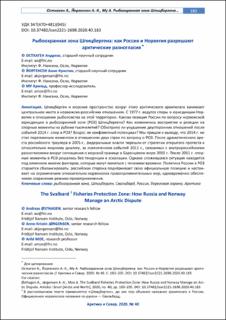| dc.contributor.author | Østhagen, Andreas | |
| dc.contributor.author | Jørgensen, Anne-Kristin | |
| dc.contributor.author | Moe, Arild | |
| dc.date.accessioned | 2021-07-28T07:21:57Z | |
| dc.date.available | 2021-07-28T07:21:57Z | |
| dc.date.created | 2020-10-08T15:43:47Z | |
| dc.date.issued | 2020 | |
| dc.identifier.citation | Арктика и Север. 2020, (40), 183-205. | |
| dc.identifier.issn | 2221-2698 | |
| dc.identifier.uri | https://hdl.handle.net/11250/2765457 | |
| dc.description.abstract | Шпицберген и морское пространство вокруг этого арктического архипелага занимают центральное место в норвежско-российских отношениях. С 1977 г. ведутся споры о юрисдикции Норвегии в отношении рыболовства на этой территории. Какова позиция России по вопросу норвежской юрисдикции в рыбоохранной зоне (РОЗ) Шпицбергена? Как изменились восприятие и реакции на спорные моменты на рубеже тысячелетий? Обострило ли ухудшение двусторонних отношений после событий 2014 г. спор в РОЗ? Возрос ли конфликтный потенциал? Мы пришли к выводу, что 2014 г. не стал переломным моментом в отношениях двух стран по вопросу о РОЗ. После драматического ареста российского траулера в 2005 г., федеральные власти перешли от стратегии открытого протеста к относительно мирному диалогу, за исключением событий 2011 г., связанных с внутрироссийскими разногласиями вокруг соглашения о морской границе в Баренцевом море 2010 г. После 2011 г. спорные моменты в РОЗ решались без тенденции к эскалации. Однако сложившаяся ситуация находится под влиянием многих факторов, которые могут меняться с течением времени. Политика России в РОЗ старается сбалансировать: российская сторона подчёркивает свою официальную позицию и настаивает на ограничениях относительно норвежских правоприменительных мер, одновременно обеспечивая сохранение режима правоприменения. | |
| dc.description.abstract | Svalbard and the maritime zone around this Arctic archipelago are central to Norway–Russia relations. Since 1977, a dispute has concerned Norway's right to exercise jurisdiction over fisheries. What are Russian positions on Norwegian jurisdiction enforcement in the Fisheries Protection Zone (FPZ)? How have perceptions and reactions evolved since the turn of the millennium? Has the deterioration in the bilateral relationship post-2014 sharpened the dispute in the FPZ, and has the risk of conflict increased? We find that 2014 does not appear to be a watershed with respect to relations in the FPZ around Svalbard. After the dramatic arrest of a Russian trawler in 2005, the Russian central authorities switched from protest to relatively conciliatory dialogue — with a marked exception in 2011 related to Russian domestic discord surrounding the 2010 Barents Sea maritime boundary agreement. After 2011, incidents in the FPZ have been handled without further escalation, but the situation is underpinned by various factors that might change. Russia’s policies in the FPZ have been a balancing act: always stressing its official position and insisting that there are limitations to how much Norwegian enforcement can be accepted, while also ensuring that the enforcement regime survives. | |
| dc.language.iso | rus | |
| dc.relation.uri | http://www.arcticandnorth.ru/article_index_years.php?ELEMENT_ID=348131 | |
| dc.title | Рыбоохранная зона Шпицбергена: как Россия и Норвегия разрешают арктические разногласия | |
| dc.title.alternative | The Svalbard Fisheries Protection Zone: How Russia and Norway Manage an Arctic Dispute | |
| dc.type | Peer reviewed | |
| dc.type | Journal article | |
| dc.description.version | publishedVersion | |
| dc.source.pagenumber | 183-205 | |
| dc.source.journal | Арктика и Север | |
| dc.source.issue | 40 | |
| dc.identifier.doi | 10.37482/issn2221-2698.2020.40.183 | |
| dc.identifier.cristin | 1838264 | |
| dc.relation.project | Fridtjof Nansens institutt: 485 | |
| dc.relation.project | Norges forskningsråd: 302176 | |
| cristin.ispublished | true | |
| cristin.fulltext | original | |
| cristin.qualitycode | 1 | |
